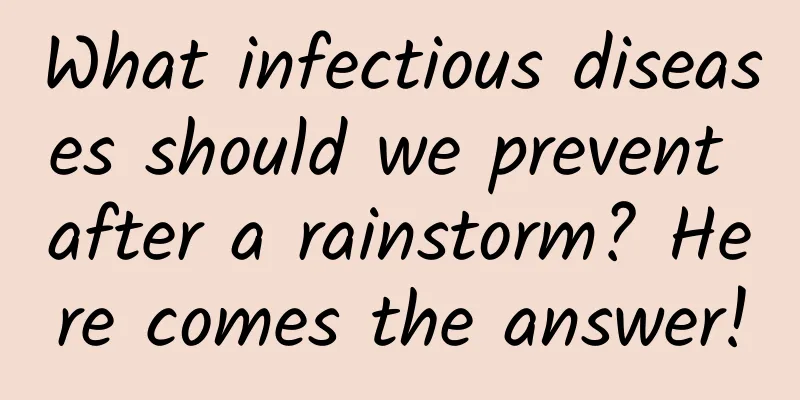What infectious diseases should we prevent after a rainstorm? Here comes the answer!

|
now Rescue operations are underway in many places Heavy rain in Henan has touched the hearts of countless people … The rainstorm will eventually pass After this disaster Epidemic prevention work To attract people's attention 1 What infectious diseases should we be wary of after floods? After a flood, even if it is determined that the original water source has been treated with mature technology and the initial output state can be guaranteed to meet the drinking water standards, it may be re-contaminated by toxic and harmful chemical substances and biological pathogens during the water transportation, distribution and storage process due to the impact of large-scale serious waterlogging in urban areas. If people in the disaster area follow their previous habits and use raw water to wash vegetables and fruits, and wash pots and dishes, food poisoning and water-borne diseases may occur. Especially in rural areas, floods cause pesticides, fertilizers and other chemicals to be soaked, washed and dissolved by flood water, directly contaminating shallow water sources such as well water and stream water, and secondarily contaminating food. Especially in the hot summer, microorganisms will multiply in large numbers in a very short period of time, which can easily cause intestinal infectious diseases such as typhoid/paratyphoid, bacillary dysentery, cholera, hepatitis A, hepatitis E, other infectious diarrhea and food poisoning. 2 What should we pay attention to when drinking water after a disaster? It is particularly noteworthy that infectious diseases caused by water and food contaminated by floods may cause outbreaks and aggravate secondary disasters. Therefore, everyone in the flood-stricken area must not take it lightly! Adequate drinking water after a disaster is the key to maintaining physical strength and enhancing resistance, whether for the military and civilians fighting on the front line of disaster relief, or for the elderly and young children. Therefore, the first batch of relief supplies should include barreled drinking water and bottled mineral water to ensure the drinking water needs of people in the disaster area in the short term. After the flood recedes, relevant departments should evaluate the water source as soon as possible, and professional personnel should guide the cleaning and disinfection of water supply and storage pipeline equipment. During this period, residents need to actively cooperate, disinfect their own tableware and utensils, adhere to the principle of keeping raw and cooked food separate during food preparation and storage, and also pay great attention to hand hygiene. 3 What should we pay attention to in post-disaster diet? After the flood disaster, because the market supply and transportation of food were affected, most people followed the principle of not wasting food and dried the food that had been damp or even soaked by the flood before eating it. However, under the high temperature and high humidity conditions during the flood season, any food that has come into contact with flood water is extremely susceptible to contamination. The World Health Organization has also issued an urgent reminder: all food that has come into contact with flood water must be discarded! In particular, livestock and poultry that have drowned or starved to death cannot be cold-slaughtered for consumption. When fields are flooded, the various microorganisms that already exist in the soil will multiply. Scientific diet and reasonable nutrition after floods are important for enhancing immunity and preventing infectious diseases. Especially for people with hypertension, diabetes, cardiovascular and cerebrovascular diseases, when receiving disaster relief food or eating temporary group meals, they should still adhere to a reasonable dietary pattern with less salt, sodium, sugar and oil to control the disease and prevent the occurrence of complications. Young children, pregnant women and the elderly and infirm should try to have a diversified and balanced diet, while ensuring the safety of food and water. When the food supply is not sufficient, you can consult a qualified nutritionist or clinician to supplement health products to meet the nutritional needs of special physiological periods, prevent nutrient deficiencies, and maintain and promote health. Source: Science_China (ID: Science_China) Experts in this article: Pa Lize, chief physician of nutrition, former deputy director of the Institute of Chronic Disease Prevention and Health Management of the Xinjiang Uygur Autonomous Region Center for Disease Control and Prevention Producers: Mou Yanqiu and Chen Jingchun Editor: Zhang Linglin Proofreading: Dong Jingxue |
<<: What is the origin and production area of Peaches? What does Peach taste like?
Recommend
The harm of eating spicy hot pot to women
Chuan Chuan Xiang is one of the foods that people...
Is it better to eat heavier watermelon? What are the dangers of eating overnight watermelon?
Watermelon is a common fruit in summer. It tastes...
Requirements for girls to donate blood
Donating blood is an unconditional responsibility...
Female armpit accessory breast picture
Axillary breast is really a nightmare for female ...
What is the reason for less menstruation?
Lack of menstruation is closely related to the de...
@Dear citizens, please remember these key points about food safety!
Food is the first necessity of the people, and fo...
What should a woman do if she wakes up with body aches?
Many people have experienced this phenomenon in t...
Canalys: Southeast Asia smartphone shipments to grow 20% year-on-year in January 2024
Highlights of the five major markets in Southeast...
If you choose peritoneal dialysis, can you not choose hemodialysis? How should you choose?
1. The two are not completely mutually exclusive ...
What is bleeding during the first week of pregnancy?
The first week of pregnancy is the most critical ...
What does it feel like to breathe oxygen during pregnancy?
Oxygen is something that people need to breathe i...
What is good for shrinking pores?
If you have large pores, you will feel very infer...
What foods should not be eaten during menstruation?
There are many foods that cannot be eaten during ...
Conservative treatment of ovarian cysts
Ovarian cyst is a type of ovarian tumor. This dis...
What causes bad smell in lower body?
Everyone has a different body odor. Some have mor...









